-
27 July 1276-Death of James I of Aragon
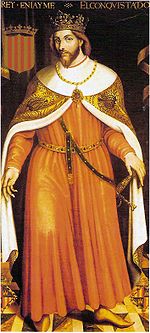
1365-Death of Rudolf IV, Duke of Austria
1382-Death of Joanna I of Naples
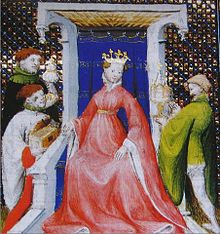
1452-Birth of Ludovico Sforza, Italian son of Francesco I Sforza

1534-Chapuys to Charles V.
I received two days ago your majesty's letters of the 8th inst., since the date of which you will have learned from mine what has passed since I was at Richmond about the Queen and her servants, who after much annoyance have been released. No answer has yet been given, notwithstanding their promises, to the remonstrances I made both at Richmond and before in this town to all the Council, for all my solicitations; but they have thought better to sent it to your majesty by the resident ambassador, and the writing he has presented to you is about this. Neither has any answer been given me about leave to visit the Queen, although I have been extremely importunate for it. In this, as I mentioned in my last, they have behaved with great rudeness. It would be too long to relate the whole story; but after innumerable delays and excuses I desired Cromwell to fix an hour for me to see him upon that and other matters. He granted me 3 o'clock p. m., and at 1(“et dela à une heure”) sent me an excuse that he was summoned to Court by the King. It was only an invention, and to color it he made preparations as if to go to Court; but he only went to a house of his own half a league hence. I afterwards pressed for an audience with him three or four times, but he always excused himself. At last I wrote him the note mentioned in my last letters; and although he sent to me to say that I Should have answer from the King his master before I left to go to the Queen, and he gave me some hope that I should have leave to visit her, I had neither the one nor the other.
On the day mentioned in the said note, which was the day after my last letters, I set out with about 60 horses, both of my own men and of certain Spanish merchants here, to visit the Queen; and it happened most conveniently for my purpose that the way lay through the whole length of this town. On the second day a messenger on horseback riding at full speed went before us and returned afterwards to where I lay, accompanied by an honest man sent by the Queen's chamberlain and steward to inform me that they had received commands by the said messenger not to let me enter where the Queen was or speak with her. My answer was that I did not intend to displease the King, either in this or in anything else, but that considering the solicitations I had made to know the King's intentions in this matter, and that I had come to within five miles of where the Queen was, I would not return so lightly, until for my discharges they had either told me by word of mouth or signified it to me by letters. Next day early in the morning another man came to us of more authority than the first, being one of the old servants of the Queen, to assure me as an officer of the King that the said chamberlain and steward had express charge from the King to do that of which they had sent me word; adding on the part of the said chamberlain and steward, and on his own also, that they did not think it advisable that I should come to the house, or even pass through the village, which is but a gunshot from it, fearing that the King their master would take it ill, as the report of his refusal would be all the more confirmed and create great murmurs. To ascertain more expressly the wish of the said chamberlain and steward, I sent one of my men to them, to whom they held the same language. As my man was returning he met one of those sent by the King last year into Germany, who is a cunning fellow (un fin gallant), and was going where the Queen was. I waited all day to see if he would send to tell me anything, and also to understand meanwhile the Queen's pleasure, who sent to me to say that she held herself as well satisfied with my journey as with any service I could have done her, and was greatly bound to me for it; and as to going further to Our Lady of Walsingham, she left that to my discretion, and that she had no opportunity to write to me at Present, but would soon do so at great length. One of her chamber gave me to understand that, although she did not dare to declare it, he knew well she would have great pleasure if part of the company were to present themselves before the place; which they did next day, to the great consolation, as it seemed, of the ladies with the Queen, who spoke to them from the battlements and windows; and it seemed to the country people about that Messiah had come.
It appeared to me that if I went on to Walsingham, it would be thought I had not gone chiefly to visit the Queen, so I determined to go no further, and I sent word to the person whom the King had sent thither, that to comply with the King's wish I would not only refrain from going to the said village, but also out of regard for the same considerations I would give up my pilgrimage to Walsingham, so as to take away all matter of suspicion and not to forsake the policy I had always followed, to do all good service in my charge. The said person wished to pretend that he had not come thither by the King's order and that what the chamberlain and steward had sent to tell me was not by the King's command, as he afterwards attempted to persuade me; but at last he contradicted himself, and was obliged to confess the truth. On the return of my man, I set out to return hither by another road, in order that more people might be made acquainted with the affair, since I could not be blamed for it. The said person being informed by his spies of my departure, immediately followed me, and did not discover himself to me or any of the company until the day I was about to enter London. He then came and saluted me, and inquired if I had any commands. I begged him to tell Cromwell that I should have thought it more honorably done if the King and he had informed me of the King's intention before my removal from London, so that all the world should not have been informed of such a case, to which I could not modestly give a name, but since he has so pleased, the Queen had to thank him, seeing that the rudeness shown to her would be so notorious that it could not well be Palliated. Likewise I thought myself greatly bound to the said King that he had allowed me to give sufficient evidence that it was not my fault I had not done my duty; and that it was not necessary the said King should send more and more men to hinder me from seeing the Queen, for If I had only known that I was forbidden to do so, I would not have attempted it without knowing the King's express will, and for this cause I had written to Cromwell before my departure; and thereupon I dismissed him without further talk, although he showed some desire to converse with me; and notwithstanding that he showed himself very anxious to come and dine in this town, he stopped where I was to dine and dined with me. After dinner, besides that he wished to inform me of the two things above referred to, he said it appeared to the said chamberlain and steward that I ought not to be astonished or to take ill the refusal I had met with, which was justified by several considerations, and that if formerly, when peace and amity the most cordial prevailed between England and Spain, the English ambassadors had been refused leave to speak to the lady Joan your majesty's mother, who was the true queen of Spain, there was still more reason in these troubles to deny me an audience of the Queen. I said this argument did not proceed from the above-mentioned persons, who never had been men of the Court till now, and that they knew as little of the charge of the ambassadors of the time referred to as I did, who was a long way off, but that if he was commissioned by the King to tell me this, I might reply to him in such a fashion that he should find the truth of the proverb âMalefactum excusando facils deteriusâ. He totally denied having any commission, saying he believed firmly that the King and his Council would give me such reasons as ought to satisfy me. I replied that as to myself I was satisfied, but they would have to satisfy your majesty, and that I thought if matters were well understood apart from personal feeling, your majesty and the King his master would remain as great or better friends than you had been, for which reason I would not put myself between two such millstones by doing anything except what tended to the preservation of the amity. I therefore begged the said person to ask Cromwell what he wished me to write in this matter to your majesty, whether the simple truth, or what else. He questioned me several times what I wanted to do with the Queen. I said that was not his business, but that if the King or his Council wished to know, I would declare it willingly; and this I said, as it was a matter of great importance, in order to make the King anxious to call me about it.
I cannot imagine why the Queen has been so very urgent that I should go to her, as she has sufficient opportunities of writing or sending to me, unless it be to let all the world see, especially her wellwillers, that your majesty had [not] forgotten her, as the opposite party has given people to understand; and for this purpose I could have done nothing more to her satisfaction than what I have done, or more to the mortification of the Lady and of those who have counselled keeping me so long without an answer, though they pretend all they can not to feel it. Your majesty may judge by these things the extremity to which matters are reduced, and the truth of what the English ambassador has written as to the Queen's treatment, who is, if one can say so, more a prisoner than before, for not only is she deprived of her goods, but even a Spanish lady who has remained with her all her life, and has served her at her own expense, is forbidden to see her. It is true that in the house where she resides a great deal is spent in victuals, but as the Queen says, it is not for her servants, for she only counts five or six of them her own, and a few other ladies. The rest she considers her guards to keep her prisoner.
If we come to speak of the assistance to the landgrave of Hesse, I will act as your majesty has been pleased to write to me. The King has not been glad of the appointment of the said Landgrave, nor of the news reported from France by Rochford, among which is the delay of the interview till April, and those here say the reason is that the lady de Boulans (Anne Boleyn) wishes to be present, which is impossible on account of her condition.
The doctor of Hamburg whom those of Lubeek promised to bring here has come, and it is said the King has sent for Melanchthon and another.
The ambassadors of Lubeck and Hamburg have had much communication with the Council, who came to meet them three days ago at the house of the archbishop of Canterbury, on coming from Richmond, and gave them a great reception. It is not known yet whether they have made any treaty. I am told those of Hamburg do not draw very well with the Lubeckers. The King has laden two vessels with artillery for Ireland, and it is said he is raising 1,000 or 2,000 men on the frontier of Wales. Skeffington is not yet departed. The King is not sending thither any vessel of his own, nor has he any “de sobrez,” for with all his boasting about building ships he has only six in this river which he can use, of which he has equipped two, and one he has bought of his treasurer, and one large one which he is getting repaired. I went to see them two days ago, knowing that the King had been there in the morning on his way to Eltham to see his bastard daughter, and before he came to Eltham he sent a gentleman to make the Princess withdraw into her chamber that she might not see him.
Of late lord Dacres, who was accused of treason and detained since the peace made with the Scots, was brought to hear his sentence, and everybody expected that he would be despatched, seeing that the King had seized his goods, which are wonderfully great and equal to those of any lord in England. The Lady used her influence against him because he had always maintained the cause of the Queen and Princes. Nevertheless he defended his cause so well for seven hours that he was declared innocent by 24 lords, unanimously, and acquitted by 12 judges according to the custom of England; which is one of the most novel things that have been heard of for 100 years, for no one ever knew a man come to the point he had done and escape. And there was never seen for one day such universal joy shown in this city as there was at his liberation. The duke of Norfolk filled the Royal seat at the trial, and the ambassador of France stood by in a window in disguise; and the said Duke and the others could not dissemble about the said acquittal, fearing that if Cromwell began to lay hands on such blood, he would follow [the same course] as the Cardinal. And notwithstanding the said acquittal, the said lord Dacre, who was declared to have served the King as loyally as any lord, has been for reward shut up as much as ever, because he would not, as they say, sign a schedule by which they want him to ask pardon of the King; and this they do only to have his goods, or partly to disgust his friends and kinsmen, and also the said lords.
The Queen lately having to pay two bills of exchange from the count of Cifuentes, the one of 160 ducats supplied long before the sentence for the notaries and proctors, the other for the courier who brought the sentence, amounting to 140 ducats, has desired me to pay for the “propines” of the said sentence; and though I have several times written and told her that your majesty would have provided for it, she replies that she did not do it to spare your majesty, but considering that everything remaining in her power is in danger of being taken from her, it will please your majesty to command what is to be done with the said moneys. London, 27 July 1534.
1553-Sir John Cheke was sent to the Tower for his part in putting Lady Jane Grey on the throne.
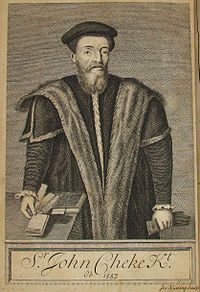
-
26 July 1309 – Henry VII of Germany is recognized King of the Romans by Pope Clement V.
1469 – Wars of the Roses: the Battle of Edgecote Moor, pitting the forces of Richard Neville, 16th Earl of Warwick against those of Edward IV of England, takes place.

The Battle of Edgecote Moor took place 6 miles northeast of Banbury (Oxfordshire), England on 26 July 1469 during the Wars of the Roses. The site of the battle was actually Danes Moor in Northamptonshire, at a crossing of a tributary of the River Cherwell. The battle pitted the forces of Richard Neville, 16th Earl of Warwick, against those of King Edward IV. The battle is considered to be an important turning point in the course of the war.

1471 – Death of Pope Paul II

1535-Fisher's Execution.
A speech or pamphlet, in answer to the preceding brief, vindicating the King's conduct with regard to the death of bishop Fisher, and complaining of that of the see of Rome in trying to get Francis to intercede for him, and in calling him a cardinal after his death to excite the hatred of all cardinals. Repudiates also the insinuation that the intercession of Francis had precipitated his fate. The same See which used to enjoy a cruel triumph in which innocent men, women, and children were massacred, now deplores the death inflicted by law upon a traitor. The Holy See laments the death of bad men, and rejoices at that of good. It has in former times regarded the slaughter of bishops and cardinals, not merely without grief, but even with joy. It has seen all Italy, and especially Florence of late, suffering severely with no little satisfaction.
Fisher's death was the least cruel that could be devised, for he was not poisoned, as some do, nor boiled in lead, nor hanged as a traitor should be, nor burned, nor tortured, but killed with a sudden stroke of the sword,—a most merciful death for such a crime. Yet this petty orator (rhetorculus hic) absurdly complains of the kind of death to induce sympathy in many members. For this brief contains many things which are the work of Blosius, not of Paul. Taunts the Holy See with being more offended with the death of a traitor than that a man should live in notorious adultery; though, as regards adultery, Paul III. took the King's side before he was Pope, and he might as well have abstained from appealing on that subject to the French king, who, with all his councillors and the universities in his kingdom, pronounced the marriage with Katharine null. Repudiates the imputation of schism, declaims against the pretensions of the Pope to afford protection to his cardinals in doing wrong, and ridicules the notion that things were treated of between England and France at Calais to the universal injury of Christendom.

1538 – Death of George Talbot, 4th Earl of Shrewsbury, 4th Earl of Waterford.He was the son of John Talbot, 3rd Earl of Shrewsbury, and Lady Catherine Stafford, daughter of the 1st Duke of Buckingham
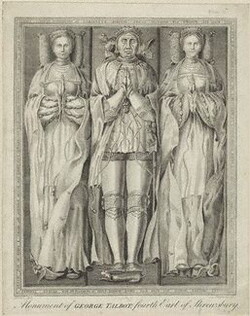
Effigy of George Talbot on the Talbot monument in Shrewsbury Chapel, Sheffield Cathedral. His wife Anne is on his right side and Elizabeth on his left.
1581 – Plakkaat van Verlatinghe (Act of Abjuration): the northern Low Countries declare their independence from the Spanish king, Philip II.
The Act of Abjuration or Plakkaat van Verlatinghe, signed on 26 July 1581 in The Hague confirmed the decision made by the States-General of the Netherlands in Antwerp on 22 July 1581, formally declared all magistrates in the provinces which united in the Union of Utrecht absolved of their oath of allegiance to their overlord, Philip II of Spain. It stated that by oppressing and violating the ancient rights of his subjects, Philip was considered to have vacated his thrones in the Low Countries. As such, it was the formal declaration of independence of the Low Countries.

1614 - Death of Henry Grey, 1st Baron Grey of Groby.He was the only surviving son of Lord John Grey of Pirgo, Essex, and Mary, daughter of Anthony Browne, 1st Viscount Montagu and Magdalen Dacre and was educated at Christ Church, Oxford. He succeeded his father in 1564 and was knighted in 1587.
source:http://www.british-history.ac.uk/,wikipedia
-
1404 –Birth of Philip I, Duke of Brabant
1421 –Birth of Henry Percy, 3rd Earl of Northumberland

1472 – Death of Charles of Artois, Count of Eu
1492 –Death of Pope Innocent VIII

1535-Chapuys to Charles V.
Since the return of the duke of Norfolk and the others from Calais I have several times written to your Majesty, and, among other things, that immediately after the said return Cromwell came to notify to me that nothing had been concluded on the part of his master, of which he wished me to inform you at once; and that I agreed to despatch a messenger, provided there was other matter to convey, such as that the King would accept the overtures made by your Majesty, or make better ones. I have also written how, besides other three Carthusians who have been executed with the same cruelty as the former ones, they had beheaded the cardinal of Rochester and Master Morus, to the great grief of the whole people. I have also written how the affairs of Kildare prospered, and that the English were sending two persons to Lubeck and Denmark. At the request of the Princess I lately sent a message to Cromwell to know if she could be placed with the Queen; but he told me that the King his master would never consent to it, and there was no occasion for it, except that the said Queen was too papistical. He said the true means to get the Princess removed from where she was, and cured of her illness, would be to find a suitable match for her, provided it was not the Dauphin, to whom they had no intention of giving her, however much your Majesty might desire it; and that they were importuned by several petty princes of Germany, but this would degrade her too much. I think the King is not over anxious to marry, her; and, if we may trust the concubine, the dower will not cost much, because she is incessantly crying after the King that he does not act with prudence in suffering the Queen and Princess to live, who deserved death more than those who have been executed, and that they were the cause of all. Since Shrovetide I have sent a servant once or twice every week to the said Princess, but lately her gouvernante told my man that she was charged not to let him come in again. On this I have asked Cromwell to know the will of the King his master.
Cromwell tried to dissemble towards me the despatches of the two persons above mentioned, but at last, not to lose his influence with me in other things, he confessed it. They have not yet left, but are only waiting weather to sail. I have not been able to discover anything about their charge, but I fear they go in order to trouble matters in case the Count Palatine aspires to the kingdom of Denmark. From one thing to another he came to say that they see clearly that your Majesty is aiming at universal monarchy, and that you had already cast down kings on all sides (que desia vre. Mate. en avoit jecte les roys de tous coustez); and that, having the seacoast of the Levant and neighbouring countries, you only required to put the Count Palatine in possession of Denmark, and all the neigbouring countries would be compelled by fear or force to obey you, but he did not see what title the Count could claim to Denmark.
Cromwell told me that he would have paid 1,000l. sterling that your Majesty had heard a sermon made by the bishop of London a few days ago on the validity of the first marriage and the usurpation of the Pope, and that he would send it to me in writing, begging me to forward it to your Majesty. Hereupon he remarked that the King would never consent to a General Council convoked by papal or any other authority than that of your Majesty, who was the lawful head of princes and of all Christendom, to whom the right of convoking it belonged by ancient custom. Your Majesty will consider what is the meaning of this. Whatever looks or words they give there is little hope of bringing them to the right way. Their obstinacy seems to increase every day; yet they rely little on the favor of the French, of whom they are continually speaking ill, and with whom they associate very little. Cromwell, even when the bishop of Tarbes came to his gate three days ago, caused him to be told that he was gone out, when he was really playing at bowls, as the said ambassador told me, who thereupon came to visit me. I hear from France that they play them a like game in return (ilz leur en jouent bien a la pareille), for they have confiscated two English ships at Rouen by virtue of a mandate which was posted up a year ago in France. If this be so, and the French insist on keeping these ships, matters will be much embroiled between them and the English. I hear on good authority that the King intends to send Dr. Fox, his almoner, at the same time as the others into Denmark, and he will pass further into Germany. London, 25 July 1535.
1539 – Death of Cardinal Lorenzo Campeggio

1547 – Henry II of France is crowned.

1554 – Mary I marries Philip II of Spain at Winchester Cathedral.
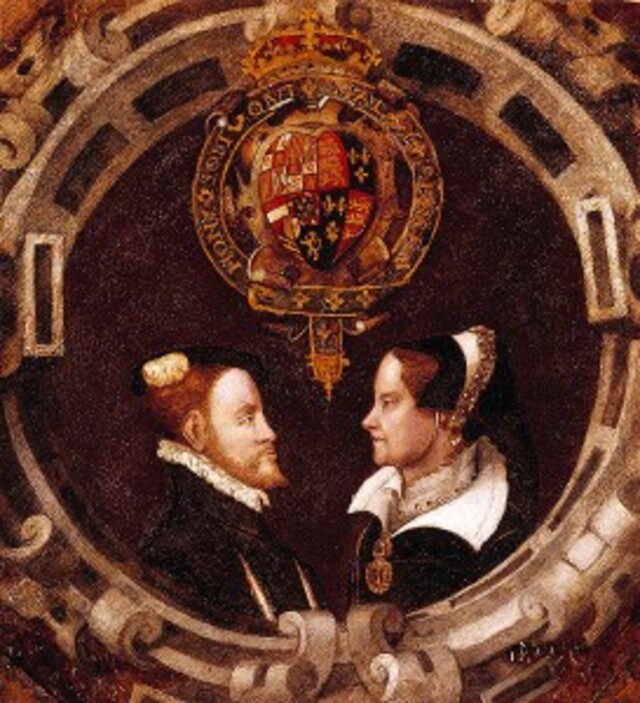
1593 – Henry IV of France publicly converts from Protestantism to Roman Catholicism.

1603 – James VI of Scotland is crowned king of England


source:http://www.british-history.ac.uk/,wikipedia
-
23 July 1411 – Battle of Harlaw, one of the bloodiest battles in Scotland, takes place.
1529 – Birth of Charles II, Margrave of Baden-Durlach
1534 – French explorer Jacques Cartier plants a cross on the Gaspé Peninsula and takes possession of the territory in the name of Francis I of France.
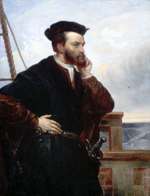
1561 –Birth of Maria of the Palatinate-Simmern
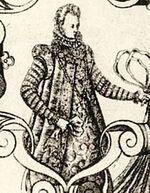
1567 – Mary, Queen of Scots, is forced to abdicate and replaced by her 1-year-old son James VI.

Between 21 and 23 April 1567, Mary visited her son at Stirling for the last time. On her way back to Edinburgh on 24 April, Mary was abducted, willingly or not, by Lord Bothwell and his men and taken to Dunbar Castle, where he may have raped her.On 6 May, Mary and Bothwell returned to Edinburgh and on 15 May, at either Holyrood Palace or Holyrood Abbey, they were married according to Protestant rites.Bothwell and his first wife, Jean Gordon, who was the sister of Lord Huntly, had divorced twelve days previously
Originally Mary believed that many nobles supported her marriage, but things soon turned sour between the newly elevated Bothwell (created Duke of Orkney and consort of the Queen) and his former peers, and the marriage proved to be deeply unpopular. Catholics considered the marriage unlawful, since they did not recognise Bothwell's divorce or the validity of the Protestant service. Both Protestants and Catholics were shocked that Mary should marry the man accused of murdering her husband.The marriage was tempestuous, and Mary became despondent. Twenty-six Scottish peers, known as the confederate lords, turned against Mary and Bothwell, raising an army against them. Mary and Bothwell confronted the lords at Carberry Hill on 15 June, but there was no battle as Mary's forces dwindled away through desertion during negotiations.Bothwell was given safe passage from the field, and the lords took Mary to Edinburgh, where crowds of spectators denounced her as an adulteress and murderer.The following night, she was imprisoned in Loch Leven Castle, on an island in the middle of Loch Leven.Between 20 and 23 July, Mary miscarried twins.On 24 July, she was forced to abdicate in favour of her one-year-old son James. Moray was made regent,while Bothwell was driven into exile. He was imprisoned in Denmark, became insane and died in 1578.

1568 –Death of Carlos, Prince of Asturias

source:wikipedia
-
23 July 1301 – Birth of Otto, Duke of Austria

1339 – Birth of Louis I, Duke of Anjou
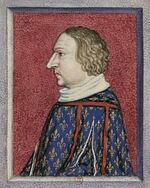

1403 –Death of Thomas Percy, 1st Earl of Worcester

1503 – Birth of Anne of Bohemia and Hungary
1528-The divorce-Promise of Clement VII. that he will grant no letters of inhibition or other letters interfering with the execution of his commission to the Legates, but will confirm their decision. Viterbo, 23 July 1528
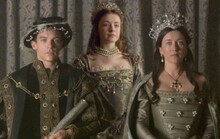
1529- THE DIVORCE.
Proceedings of the Legatine Court, containing depositions of witnesses, &c.
Begins with the words, ... "decreverunt eidem procuratori Regis copias omnium et singulorum gestorum et exhibitorum illo die et tribus sessionibus proximo præcedentibus dandas fore, præsentibus tunc memoratis domino abbate Westmon., et Thoma Arundell, armigero, et aliis multis in copiosa multitudine congregatis, die vero supradicto Veneris, videlicet 16o die mensis Julii, &c."
Admission, on the petition of John Hughes, of Wm. Falk, notary, John Taverner, and John Clamport, citizens of London, as evidence on the 2nd article. Depose to the existence of certain writings touching this cause. Adjourned till the Monday following. Agreed, on the motion of the same Hughes, touching certain evidences in the possession of Garter, that John abbot of Westminster, Wm. Burbank, archdeacon of Carlisle, and _ Hygons, canon of Sarum, shall report upon the same. Richard Sampson, the King's proctor, to be present at the search.
Monday, 19 July.—Proceedings touching the breve of pope Julius. Process exhibited by Sampson Michell, canon of Chichester, of Geoffrey Wharton, official of the bishop of London, with the subscription of Rob. Johnson, notary, containing the depositions of Agnes duchess of Norfolk, and Mary countess of Essex, as in No. 5778. preceding.
Note at ƒ. 209:—"Desunt hic acta et depositiones testium examinatorum per Fra[n]klyn et Tailor."
Depositions of the abbot of Westminster, Burbank, and others, of searches made in the Exchequer at Westminster, 14 July 1529; present Ric. Warner, sub-chamberlain, and Ric. Longman, doorkeeper. Also, in the Orphan's Chamber at Guildhall, made by Th. Wryethesley, King-at-arms, and Th. Tong, Norroy. In a great register of the latter the following words were found:—"The year of our Lord God 1502, the 2nd day of April, in the castle of Luddelow, deceased the prince Arthur, first-begotten son of our sovereign lord king Henry the VIIth, the 17th year of his reign; immediately after whose decease Sir Richard Pole, his chamberlain, wrote and sent letters to the King's council to Greenwich, where his Grace and the Queen lay, and certified them of the Prince's departing; which discreetly sent for the King's ghostly father, to whom they showed this heavy and sorrowful tidings, and desired him, in his best manner, to show it to the King's highness; which, in the morning, the Tuesday next following, somewhat before the time accustomed, knocked at the King's chamber door. And when the King understood that it was his confessor, he commanded to let him in; which confessor, after due salutation, began to say, `Si bona de manu Dei suscipimus, mala autem quare non sustineamus ?'—and so showed his Grace that his dearest son was departed to God."
In another ancient book of calendars (calendarum)—"This day was born the lord Herre, 1481" (sic), on 28 June; and in another—"Nativitas R. H. VIII., 28o die Junii 1491, Greenwich." Marriage of prince Arthur and Katharine at St. Paul's, 24 Nov. 1501.
In the Council Chamber they found a printed book of the names of the bailiffs, mayors, and sheriffs of the city of London, with this passage:—"This year (17 Hen. VII.) was sent unto England the king of Spain's third daughter, named Katharine, to be married to the prince Arthur; and she landed at Plymouth the 8th day of October, and [was] received into London in the most royal wise the 12th day of November, then Friday, and the Sunday following married at St. Paul's Church; and an halpace made of timber from the west door to the quire door, of 12 foot broad and 4 foot of height, and in the midst of the same married; and the feast holden in the Bishop's palace. And from London Bridge to Paul's in divers streets were made royal and costly pageants. And at the west door of Paul's was made a costly pageant, running wine, red, white, and claret, all the day of the marriage. And at the same triumph the King made 57 knights. And the Tuesday after, all the court removed to Westminster by water, and the marriage, with all the crafts with them, in barge[s], with trumpets, shawms, and tabrets, in their best manner. And there the King held royal jousts, tourneys, and banquets six days after, and then removed to Richmond, &c."
Examination of Fox, bishop of Winchester, by Ric. Wolman, archdeacon of Sudbury, on the 5th and 6th of April 1527, in the Bishop's chamber in the castle of Wolvesaye, in the city of Winchester, in the presence of Andrew Smith, notary. Says he is 79 years old; and it is now 41 years since he knew Henry VII. Knew prince Arthur, who was born in the priory of St. Swithin's, Winchester, and baptised in the monastery;—he being secretary to Henry VII., and present. Says he baptised Henry VIII. in the Church of the Observants at Greenwich. Remembers the entry of queen Katharine into London, and met her in St. George's Fields, and conducted her into London. Does not remember anything of the matrimonial contract between her and Arthur. Was present at the solemnization at St. Paul's. Thinks the contract was passed some time before. Thinks the Prince was of sufficient age for marriage, but cannot remember how old he was. Says they cohabited in the palace of the bishop of London, near St. Paul's, for about 14 days, and after that resided in Wales, to the Prince's death. After his death, negotiations took place for a marriage between Katharine and Henry, at which he was present, and had many conferences with Dr. De Peohebla, Spanish ambassador. Is not certain whether Henry VII. proposed the marriage. Thinks it was done by De Peohebla,—how long after the death of Arthur, cannot say. Does not recollect whether any writings took place. Says that frequent deliberations took place between the King's councillors, of whom he was one, in reference to the impediment. Thinks there was a contract between the two. Does not know the express age of the Prince. Is certain that a bull was obtained from the Pope, which was then thought sufficient for contracting the marriage and removing the impediment. Believes that various bulls were obtained, two of which remain in England, and one or two in Spain, all of the same tenor. On a copy of the bull being read to him, stating that Henry desired the marriage, and yet at the time of the bull he was a minor, believes the suggestion was a true one, so far as the peace of the two kingdoms was concerned; but whether the King desired the marriage at the time of the bull, says he does not know what the King's mind was. Says the bull was obtained by the ambassadors of the two kingdoms, and chiefly by Adrian cardinal St. Chrysogon. Does not suppose that the consent of Henry was asked about the bull, as he was then a minor. He cannot speak of his own knowledge, but he thinks that Henry desired the marriage, and that he loved Katharine for her excellent qualities. Does not remember that Henry, when he arrived at the age of puberty, expressly consented to or dissented from the marriage between himself and Katharine. He thinks, however, that a protestation was made, "quod dictus invictissimus princeps, non obstantibus prioribus sponsalibus inter ipsum et dictam clarissimam Catherinam factis, nec quibuscunque verbis aut douariis in ea parte intervenientibus, nec quod insimul in eadem domo et familia illustrissimi Henrici VIImi, patris ipsius invictissimi Henrici octavi, in minore ejus ætate cohabitassent, tunc ad annos pubertatis perveniens, non intendebat obligari ad observationem hujusmodi sponsalium in minore ejus ætate contractorum, quam quod posset pro suo arbitrio accipere quamcunque vellet aliam sibi in uxorem." Thinks this protest is still to be found with Master Ryden, clerk of the Council. Does not remember that Henry VII. ever interdicted the Prince, after this protest, from showing signs of love to Katharine. Thinks the protest was made by command of Henry VII. Believes it was made before Ryden, the notary; and that either he, or Thomas Ruthall, or West, now bishop of Ely, drew it up, in the presence of the earl of Surrey, Dr. Peohebla, and princess Katharine, at Durham Place, in the suburbs of London. Does not remember that any public instrument was made of the protest. If so, it was delivered to Henry VII. Does not think any new dispensation was gained. Says he had many conferences with Henry VII. after the death f prince Arthur, and that his intention always was that Henry should marry Katharine; but the solemnization was put off on account of the disputes between the King and the king of Spain touching the re-demanding of the dote. Says he did not know that Henry VII. ever wished to marry the mother of the present Emperor (Joan), but he intended to marry Margaret duchess of Savoy. Asked if Henry VII. communicated to him any designs of other marriages for the Prince, after his protest, and whether he wished him to marry the sister of the king of Spain: says he never heard of such a wish. Refers him to the laws how far the bull must be deemed sufficient.
On the Bishop's declining to subscribe his deposition on account of his blindness, and none of his counsellors being allowed to be present, the said Ric. Wolman said he was instructed to sign it, if necessary, in the Bishop's name. Whereupon, out of deference to the King's command, he signed it.
Attestation by Augustine Spinola, cardinal and papal chamberlain, 27 Jan. 1529, 6 Clem. VII., of the breve granted by Julius II., 6 July 1504.
Copy of the breve of Julius II. to Henry VII., 22 Feb. 1505.
Oath of Wriothesley.
Sittings on Wednesday, 21 July.—Protest of Henry prince of Wales. (fn. 4)
Sittings on Friday, 23 July.—Prorogation by Campeggio of the court to the 1st of October.
"Liber continens depositiones testium, et processum habitum coram Legatis.—Ricardus Watkyns, prothonotarius regius."
Lat., pp. 134, imperfect at the commencement. Endd.
Record of the proceedings at twelve sessions of the Papal Commissioners in the matter of the divorce of Catharine of Aragon.
1531 – Death of Louis de Brézé, seigneur d'Anet, husband of Diane de Poitiers
1543 – Mary of Guise and her daughter, Mary, Queen of Scots, escaped from Linlithgow Palace to Stirling Castle.

1596 – Death of Henry Carey, 1st Baron Hunsdon
source:http://www.british-history.ac.uk/,http://www.onthisdayintudorhistory.com/





